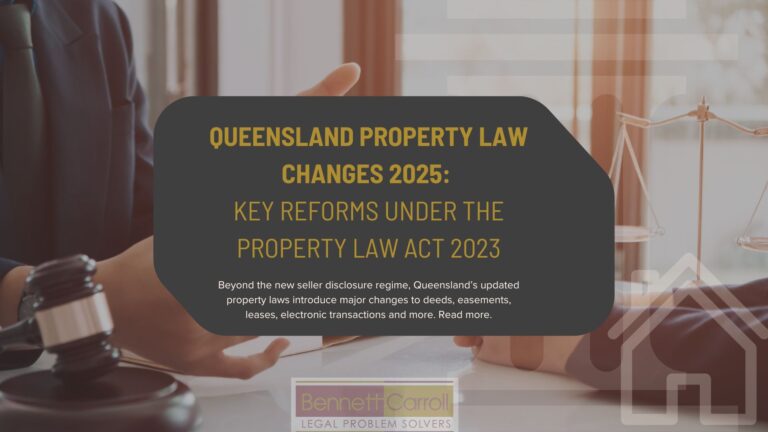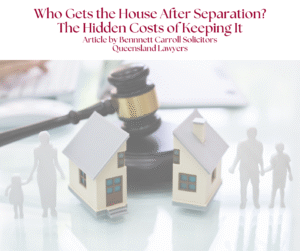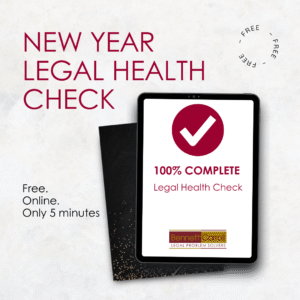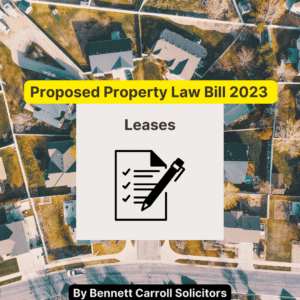Beyond the new seller disclosure regime, Queensland’s updated property laws introduce major changes to deeds, easements, leases, electronic transactions and more.
On 1 August 2025, the long-awaited Property Law Act 2023 (Qld) came into force, replacing Queensland’s existing property legislation with a modernised legal framework. Much of the public conversation has focused on the new seller disclosure regime, which we cover in detail in this article. But that’s just one part of a much broader reform.
Whether you’re a property owner, investor, tenant, developer, or commercial landlord, these new laws may affect how you manage contracts, leases, easements, deeds, and more.
Here’s what else is changing under the new Act — and what it means for Queensland property dealings from 1 August 2025.
Deeds Will Expire Sooner: Limitation Period Halved to 6 Years
Under the old law, a deed could be enforced for up to 12 years after a breach. From 1 August 2025, that period is reduced to 6 years, aligning with the timeframe for regular contracts. This means:
- If you’re holding rights under a loan agreement, guarantee, or commercial deed, you may need to act faster to enforce them.
- This change applies only to deeds entered into on or after 1 August 2025.
Tip: Review any standard form documents now to ensure they’re clear on whether they are intended to be deeds or contracts.
Easement Rules Are Being Updated — Including Positive Covenants
Currently, only negative covenants (e.g. “you must not build over this area”) in easements automatically bind future landowners. Under the new law, positive obligations (e.g. maintaining a shared driveway or fencing) will also pass with the land unless stated otherwise.
This gives more certainty around maintenance responsibilities, especially for:
- Body corporate communities
- Battle-axe blocks
- Shared utility infrastructure
Tip: Developers and property owners should review existing easement terms before 1 August.
Electronic Conveyancing and Signing Reforms
The Act paves the way for more secure digital transactions and electronic signing of documents, reflecting how conveyancing already operates in practice.
- Digital versions of property contracts and settlements will now be fully recognised.
- Witnessing requirements and formalities are being modernised.
Tip: This supports faster transactions and remote service delivery — a win for regional clients and busy professionals.
Instalment Contracts: New Protections and Clarifications
Instalment contracts (where a buyer pays in stages before getting title) will be more clearly regulated under the new law. Key changes include:
- Clarified termination rights and procedures
- Better protections for both buyers and sellers in long-term contracts
This will help avoid costly misunderstandings or unfair outcomes.
Learn more in our article: Instalment Contracts in Queensland: A Comprehensive Guide to Real Estate Transactions
Lease and Tenancy Law Updates
Leasing provisions are being updated, especially for commercial and retail leases. New implied terms and rules will cover:
- Assignments (transfers) of lease
- Quiet enjoyment and maintenance
- Remedies for breach and termination
While many of these terms reflect standard practice, having them built into the Act helps clarify obligations even where leases are silent.
Tip: Landlords and commercial agents should review leasing templates to ensure they align with the new law.
Body Corporate Disclosure Certificates (Form 13)
The Property Law Act 2023 will work in tandem with updated regulations to simplify and standardise body corporate certificates. These are required for selling units in community title schemes.
- Buyers must receive these documents upfront under the new seller disclosure regime
- Standardised forms make compliance easier
Tip: Body corporate managers should ensure they’re across the updated requirements and turnaround times.
More info on this topic: The Importance of Body Corporate Disclosure Statements
What Should You Do Now?
These changes came into effect on 1 August 2025, so now is the time to:
- Review your standard property documents
- Update precedents and templates for deeds, leases, contracts and easements
- Seek advice if you’re involved in long-term property deals, subdivisions or instalment sales
We Can Help You Navigate the Changes
Bennett Carroll Solicitors has helped Queenslanders with property law for over 50 years. With offices in Brisbane, Stafford, Upper Mount Gravatt, Kawana, Mermaid Beach and Ipswich, and full electronic service delivery statewide, we’re here to make sense of the legal changes — and keep your deals compliant.
Contact us today, 1300 334 566.
Read next:
- Queensland’s New Property Disclosure Laws: What Every Buyer and Seller Needs to Know From August 2025
- Buying Off-the-Plan in Queensland: What You Need to Know
- Conveyancing in Queensland: Why Location and Law Matter








